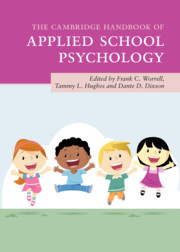Book contents
- The Cambridge Handbook of Applied School Psychology
- The Cambridge Handbook of Applied School Psychology
- Copyright page
- Contents
- Contributors
- Contributor Biographies
- Acknowledgments
- 1 Broadening the Focus of School Psychology Practice
- Part I Individual-Level Academic Interventions
- Part II Teacher- and System-Level Interventions
- Part III Interventions from Educational and Social/Personality Psychology
- Part IV Behavioral and Social-Emotional Interventions
- Part V Health and Pediatric Interventions
- Part VI Family Connections and Life Transitions
- Part VII Special Populations
- 33 School Psychologists in Early Childhood Settings
- 34 Identifying and Serving Gifted and Talented Students
- 35 How Best to Serve Court-Involved Youth in Schools
- 36 School-Based Interventions for Refugee Children and Adolescents
- Part VIII Conclusion
- Index
- References
33 - School Psychologists in Early Childhood Settings
from Part VII - Special Populations
Published online by Cambridge University Press: 18 September 2020
- The Cambridge Handbook of Applied School Psychology
- The Cambridge Handbook of Applied School Psychology
- Copyright page
- Contents
- Contributors
- Contributor Biographies
- Acknowledgments
- 1 Broadening the Focus of School Psychology Practice
- Part I Individual-Level Academic Interventions
- Part II Teacher- and System-Level Interventions
- Part III Interventions from Educational and Social/Personality Psychology
- Part IV Behavioral and Social-Emotional Interventions
- Part V Health and Pediatric Interventions
- Part VI Family Connections and Life Transitions
- Part VII Special Populations
- 33 School Psychologists in Early Childhood Settings
- 34 Identifying and Serving Gifted and Talented Students
- 35 How Best to Serve Court-Involved Youth in Schools
- 36 School-Based Interventions for Refugee Children and Adolescents
- Part VIII Conclusion
- Index
- References
Summary
In this chapter, we discuss the evolving role of the school psychologist working in early childhood settings, and highlight the importance of early learning and early intervention, standards for training and education of school psychologists to work with young children, and the role of the school psychologist in transitioning young children to kindergarten. We believe that early learning and early childhood education are critical to a healthy, thriving society, including the United States. However, most school psychology graduate programs do not offer knowledge of or experience in early childhood learning, assessment, diagnosis, or intervention. Given the importance of early childhood education and school psychologists’ evolving roles and responsibilities, they are strongly encouraged to engage in professional development activities around early childhood learning, education, assessment, and intervention in order to serve young children optimally. Multiple resources are provided at the end of the chapter to assist school psychologists in increasing their knowledge base regarding early childhood topics.
Keywords
- Type
- Chapter
- Information
- The Cambridge Handbook of Applied School Psychology , pp. 579 - 597Publisher: Cambridge University PressPrint publication year: 2020

